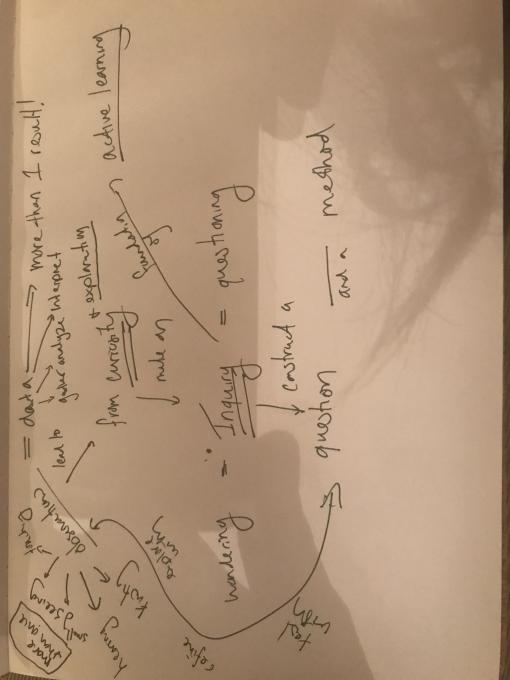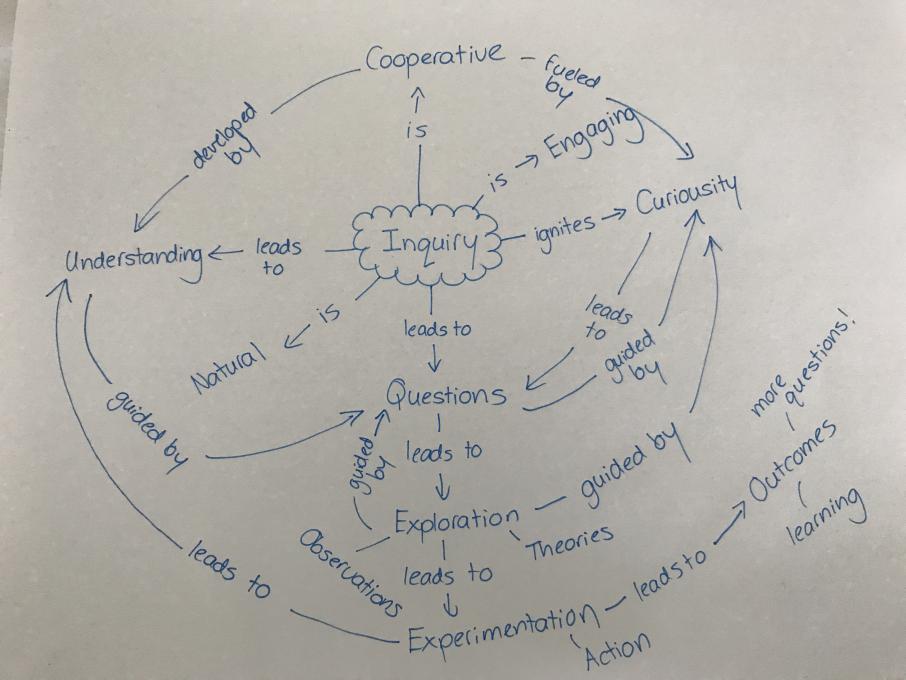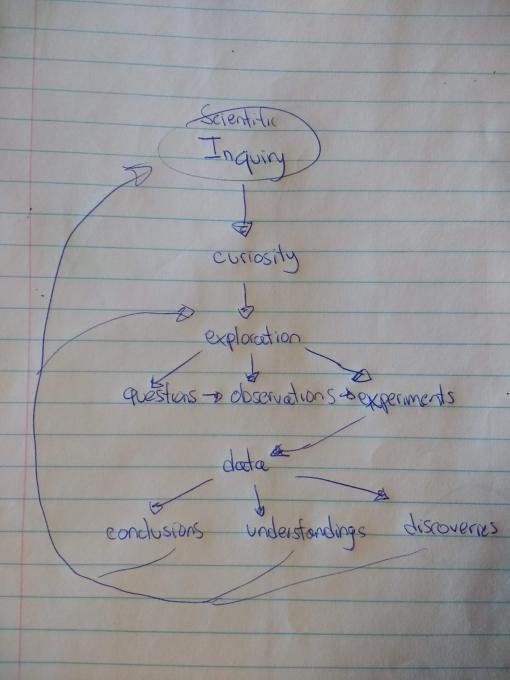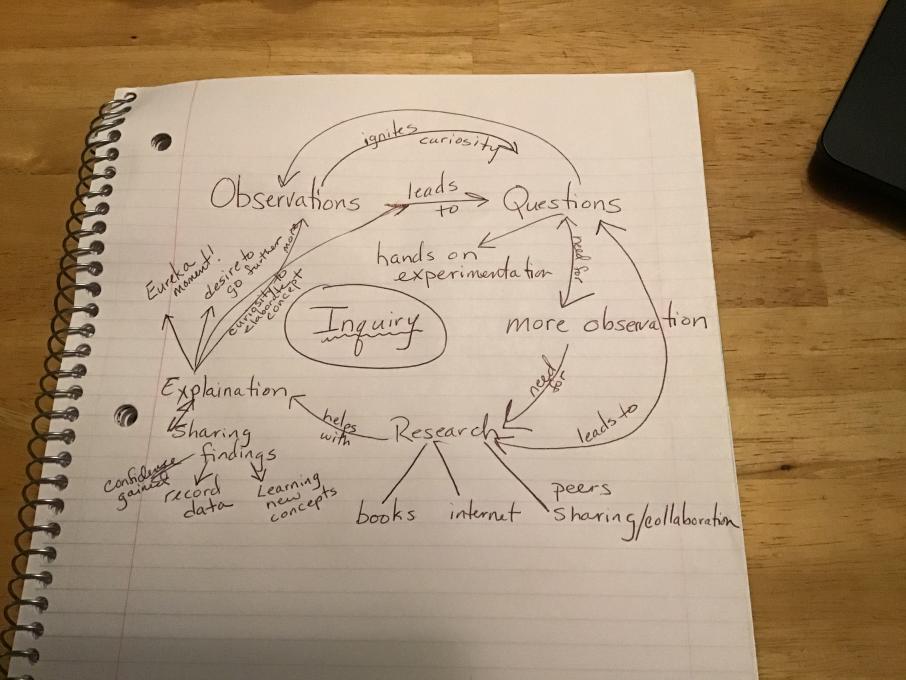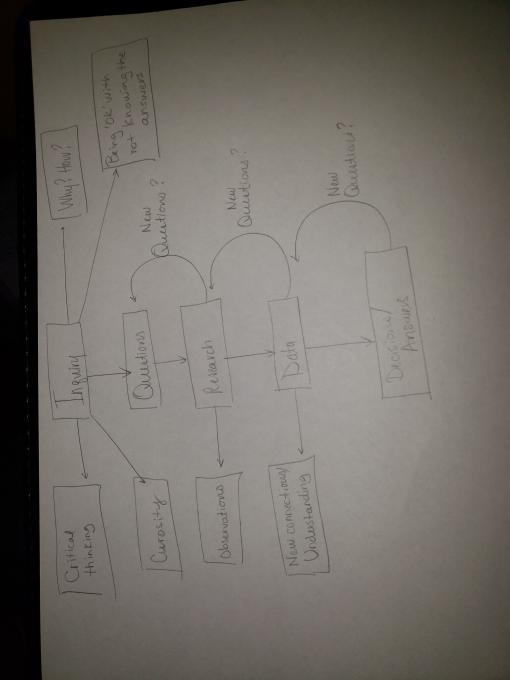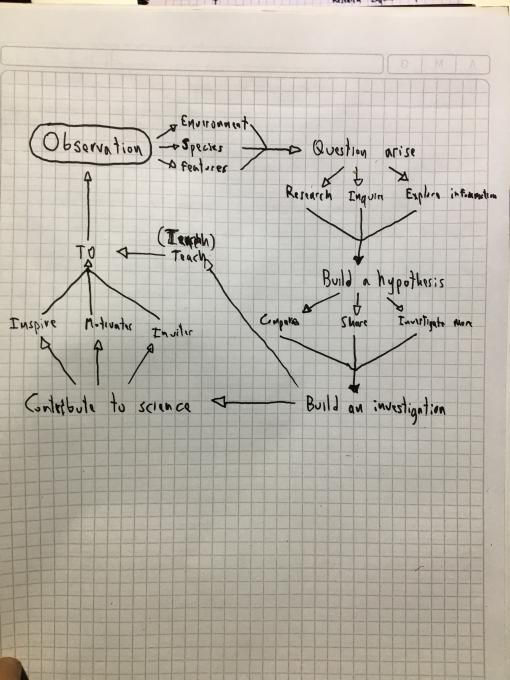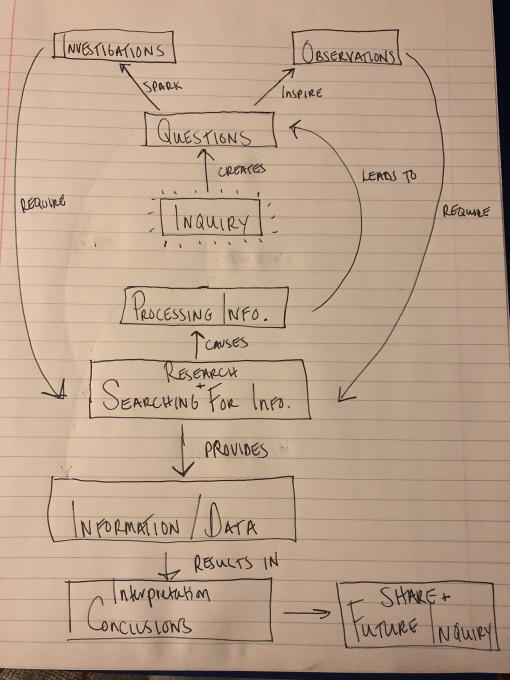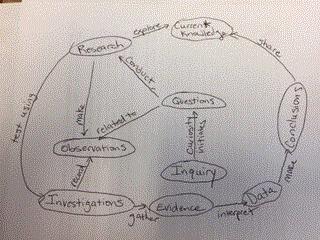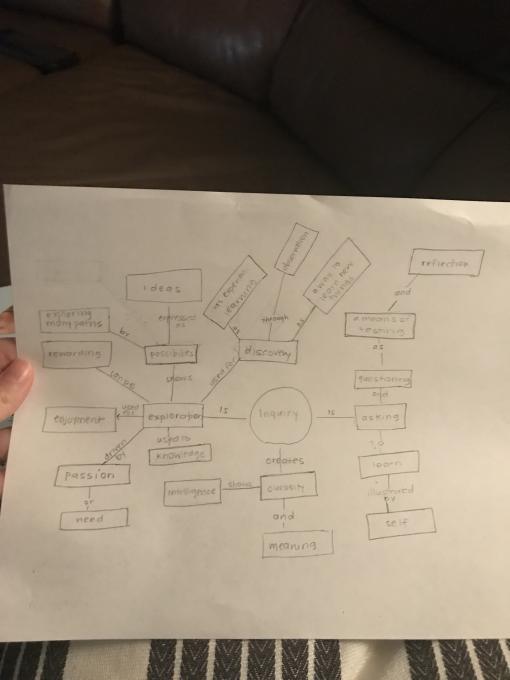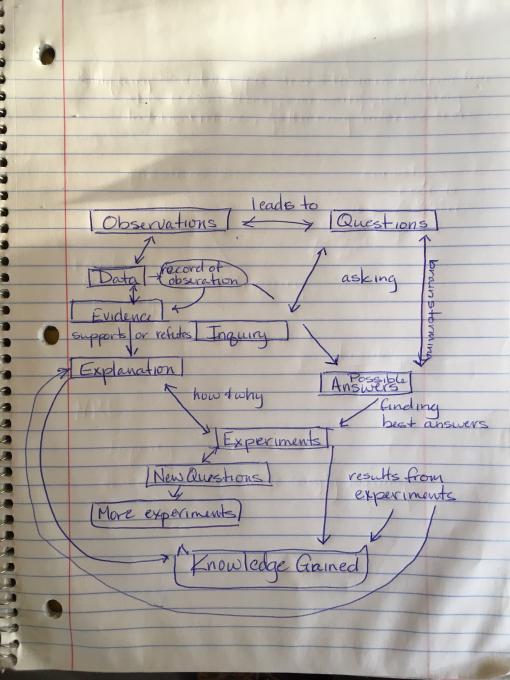The Cornell Lab Bird Academy › Discussion Groups › Inspiring Investigations through Citizen Science › Intro to Inquiry
-
 Inquiry is taking a curiosity about something - an object, event, animal, etc., and creatively using your schema to discover and explain, and eventually build your knowledge and expand your schema. I like hearing the words "creativity" and "passion" used with Inquiry, because it's about taking the world that one knows, and using that knowledge to play and observe and gain knowledge through the passionate exploration and discovery, trying to make sense of a "thing". It's easy to see how inquiry is differentiated since it is using the knowledge and skill that a person has to scaffold their own learning through their experiences. Providing the right guidance can help keep these scientists continuing their inquiry, whether the guidance is from a teacher or peer or a family member. Exploring and trying to make sense out of something, and being able to describe your conclusions with writing, numbers, and pictures is a pretty awesome journey of inquiry.
Inquiry is taking a curiosity about something - an object, event, animal, etc., and creatively using your schema to discover and explain, and eventually build your knowledge and expand your schema. I like hearing the words "creativity" and "passion" used with Inquiry, because it's about taking the world that one knows, and using that knowledge to play and observe and gain knowledge through the passionate exploration and discovery, trying to make sense of a "thing". It's easy to see how inquiry is differentiated since it is using the knowledge and skill that a person has to scaffold their own learning through their experiences. Providing the right guidance can help keep these scientists continuing their inquiry, whether the guidance is from a teacher or peer or a family member. Exploring and trying to make sense out of something, and being able to describe your conclusions with writing, numbers, and pictures is a pretty awesome journey of inquiry. -
I believe inquiry can be explained by its process, qualities and outcome. I organized my concept map into three categories - Process, Goals and Qualities. Inquiry has distinct qualities and a distinct process that distinguishes it from only using hands-on learning, active learning or the linear teaching of the scientific method in the classroom. Inquiry involves observing, questioning, collecting data, interpreting data, constructing explanations, communicating, reflecting and revisiting ideas based on a genuine curiosity about a phenomenon in order to search for a new understanding or new knowledge. Allowing students the ability to embody this process enables them to use inquiry in their everyday lives with questions that may not even be “science-y” situations. For the "goals"section, I highlighted the outcomes that can come from being engaged in the process of inquiry that I saw within the text. Specifically in my classroom, I strive to have the inquiry process lead students to accomplish the following goals:
- Gain appreciation of beauty and wonder of science
- Ability to continue to learn about science outside of the classroom
- Develop skills to be successful in future science and non-science classrooms
- Develop 21st century skills (critical thinking, creativity, collaboration, communication, information/media/technology literacy, flexibility) to be successful in future classes and career
- Gain sufficient knowledge of science to engage in public discussion on related issues
- To become careful consumers of scientific and technological info related to their everyday lives

-
I love this. I have just recently heard of Jamboard but want to use it! Your processing of the article was much like mine only the layout is different.
-
Interesting article. Inquiry can involve a whole new vocabulary and can tend to be complex for some. Inquiry is using one’s knowledge and understanding of science concepts and processes to solve realistic problems and issues. I made a rough concept map for a multifaceted activity that involves observation; posing questions; observing and other sources of information to see what is already known.

-
 Inquiry is complex, yet, simple-- hah! It relies heavily on curiosity (wonder) the drives questions coming through the imagination. Science and art help with the questions-- which includes research, exploring, designing, testing, and re-doing, and redo-ing, and re-doing. Summation and communication can occur through out the process. Everything above it rests on those 2 words. Not a linear process.
Inquiry is complex, yet, simple-- hah! It relies heavily on curiosity (wonder) the drives questions coming through the imagination. Science and art help with the questions-- which includes research, exploring, designing, testing, and re-doing, and redo-ing, and re-doing. Summation and communication can occur through out the process. Everything above it rests on those 2 words. Not a linear process. -
*throughout* (Not sure why I wasn't allowed to edit)
-
-
I found the article very interesting. I never thought of inquiry similar to what happens with art. Students are very inquisitive or artistic initially and are sometimes expected to follow the steps which squashes creativity. Also, I agree with students going down individualized learning paths. Inquiry can be affected by personal interests, students wondering about certain topics and/or having a passion to learn more. I made my concept map in a circle because I find that one inquiry can lead to another. For example, the banana experiment went beyond whether the banana would float or sink. Inquiry is a lot more complex than exploration.

-
 Inquiry is the process of exploring something interesting. It is opening yourself up to the world around you just as we did as infants! For me, it is a process of questioning, investigating, discovering, understanding and then finally, knowledge! Which then drives us into more INQUIRY and the process goes on and on!
Inquiry is the process of exploring something interesting. It is opening yourself up to the world around you just as we did as infants! For me, it is a process of questioning, investigating, discovering, understanding and then finally, knowledge! Which then drives us into more INQUIRY and the process goes on and on! -
Exactly! I like how you stated that inquiry is a process that goes on and on.
-
-
Inquiry is a process of observing the world and figuring out the why or the how. Inquiry in science education allows for a lot more creativity and critical thinking as there are multiple ways to go about answering a question. Students are not limited to one procedure or one set of tools but instead use critical thinking skills to develop an experiment or conduct research. People of all ages engage in inquiry even in an informal format. When I find a puddle of water by the sink I try to figure out why. Did someone spill? Is something leaking? Did a pet have an accident? From there it sparks investigation where I will go through a process to answer the question.

-
What an excellent summation of the inquiry process. You included important points that show how inquiry in a natural part of our lives. Thanks for comprehensive graphic communication.
-
-
Inquiry is driven by an individual's sense of wonder, interest, and passion. It is guided by our curiosity and by asking questions. Those questions then turn into discoveries, explorations, experiments, and observations. Inquiry gives us the opportunity to make connections to what we know, reflect and communicate with others our discoveries, and allows us to problem solve using critical thinking. Inquiry empowers us with skills and knowledge to be independent and life long learners.

-
Amy - your thoughts about what drives inquiry aligns with what I believe is true. Thank you.
-
-
 Inquiry is learning new information through the process of observing and asking questions. Having an opportunity to collaborate with others to share ideas to bring about understanding enhances inquiry.
Inquiry is learning new information through the process of observing and asking questions. Having an opportunity to collaborate with others to share ideas to bring about understanding enhances inquiry. -
 My concept of inquiry is based around the idea that we are there to teach children how to think, not what to think. Inquiry is encouraging/building the confidence and competence of students to formulate scientific questions about experiences they encounter in their world, look for the answer through research and experiments/more observations and then come to a conclusion based on that
My concept of inquiry is based around the idea that we are there to teach children how to think, not what to think. Inquiry is encouraging/building the confidence and competence of students to formulate scientific questions about experiences they encounter in their world, look for the answer through research and experiments/more observations and then come to a conclusion based on that -
Vanessa, I love your definition of inquiry! As a 1st grade teacher myself I really related to what you said when you stated that as educators we need to"teach children how to think, not what to think." I also agree with you that encouragement and confidence building are both essential when teaching students. I often feel like my students want me to give them the answer because in their mind that's what they are striving for...the right answer. I also agree that it's important to give students the tools to help them look for answers to their questions through research, experimentation, and observation. I enjoyed reading through your inquiry concept map too. Great job!
-
-
My concept of inquiry is based in curiosity -- in observing the world, and coming up with a question. This is where inquiry starts. Then, it becomes a cycle of making observations, coming up with an inquiry question, testing possible answers to that question, and observing those answers. Inquiry is supported by a foundation of strong observation and strong questioning skills.

-
Laura, I agree questioning is a HUGE component of inquiry! The basis of science is questioning! Nice job on your concept web!
-
Hi Laura, Curiosity is the first word that comes to my mind when I hear the word inquiry. You described inquiry in a way that reminds me of a cycle that never ends. We hope our students continue to wonder and investigate all their lives.
-
-
Inquiry is a process that is driven by exploration and curiousity of the world around us. Typically, this leads to lots of questions and observations which will result in experimentation and action to figure out answers to our questions, which will also lead to more questions thus creating a cycle. It is something that is innate in everyone, particularly young children who are naturally curious and open to exploring the world around them.

-
I agree that inquiry is a cycle. In the process of answering one question more questions are revealed. I think your inclusion the term "cooperative" is very appropriate as many times students find better solutions when they question and discuss ideas with each other.
-
Taylor your map was detailed and very interesting. I thought your arrows provided a nice visual of the multi-dimensional layers of INQUIRY.
-
Taylor - neat idea that inquiry has dimensionality and as you uncover one thought it exposes deeper during concept. Very cool. Thank you.
-
-
Inquiry is the process of carrying out curiosity through exploring the natural world. It leads to questions, observations and experiments! As a science teacher collecting data and forming conclusions naturally follow as part of the inquiry process.

-
Inquiry is a process starting with observations/ phenomena. Curiosity is ignited and questions flow. The instructor can help the group narrow down the questions to one or two that can be investigated and researched. Peer sharing and collaboration fuel the learning and discovery. More observations and applications and elaborations of the concept are a natural product of inquiry.

-
I like that you used curiosity in your concept map. Curiosity is such an important part of inquiry!
-
Nancy, I liked your concept map on INQUIRY especially including collaboration...nice job! Sometimes we forget the importance of collaboration, but I would not be where I am without it! Thanks for the reminder!
-
-
The way I perceive inquiry is that it is innate to humans. It isn't something that is taught but something that we already know to do. Seeking, discovering, exploring, questioning the world around us are inquiries into our own worlds. Inquiry also embodies the "never stop learning" philosophy because to me, just because we figure something out given the best available and current data, have we really figured it out? Do we stop asking questions? No, we do not. Unfortunately inquiry is often suppressed in traditional classrooms across a variety of disciplines so then it becomes this "new" form of pedagogy and "all the rage" which it really is not.

-
I see what you mean by it is innate and really does not need to be taught- curiosity is natural for most young children. I suppose one reason it is " new pedagogy" is that schools have traditionally not taken the time needed to really explore critical thinking and discovery. Sometime when inquiry is seen as a mandate, teachers can take the time and incorporate this style of education more easily. A welcome swing for those of us who love science!
-
-
Todo empieza con la observacion que nos lleva a realizar preguntas e inquietudes con las cuales vamos a querer buscar y consultar las respuestas, despues de esto vamos a tener una hipotesis que podremos concluir investigando mas, comparando con otros resultado e incluso aventurarnos a experimentar, para finalmente poder realizar un aporte a la ciencia que sin duda alguna va animarnos a seguir observando y no solo eso, tambien va llevarnos a enseñar e inspirar a que otras personas lo hagan.

-
My concept of inquiry is seeking knowledge, solutions & answers by being a present and engaged learner. It is about satisfying the why, through observations, research and investigations. Inquiry can also be interpretive in nature, there are different methods to reach the same conclusions.

-
Inquiry is a process of asking questions related to observations. These observations are made with our senses and can be enhanced with tools. Next is the pursuit of answers with research. Check to see what information we collectively already have. New questions may arise. More observations and/or experiments may be necessary to find the answer.
-

-
I like that your concept map is circular because I feel with inquiry we might be going in "circles" or at least coming back to our initial thoughts and questions to revise them based on new data.
-
@Liz Holly - I like your concept map and agree with Liz that inquiry is circular and you return to your initial question and thoughts as you seek understanding during the process.
-
-

-
Inquiry is seeking information about a topic or object through observation, brainstorming, experimentation , recording results of experiments, interpreting data and collecting evidence to form conclusions and sharing results, ideas and theories. Accepting input from others to challenge evidence and support strengths and highlight weaknesses of your conclusion.
-
What a great point- that accepting input can give focus to strengths & weaknesses of conclusions!
-
I agree that accepting input from others to challenge evidence and support strengths is essential to the growth of knowledge and reminds me of the phrase "on the shoulders of giants".
-
I agree! Being able to give and take constructive criticism or input is an important part of the inquiry process. No one lives on an island, so to speak, and both positive and negative feedback is essential to arriving at a strong conclusion.
-
-

Read More:
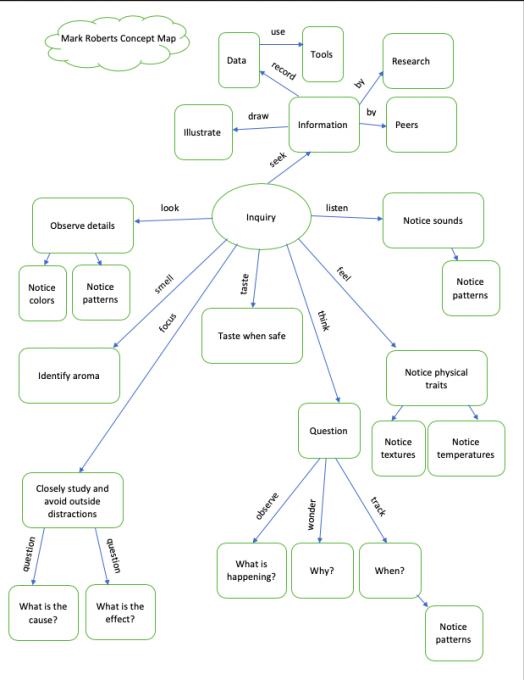 Inquiry is taking a curiosity about something - an object, event, animal, etc., and creatively using your schema to discover and explain, and eventually build your knowledge and expand your schema. I like hearing the words "creativity" and "passion" used with Inquiry, because it's about taking the world that one knows, and using that knowledge to play and observe and gain knowledge through the passionate exploration and discovery, trying to make sense of a "thing". It's easy to see how inquiry is differentiated since it is using the knowledge and skill that a person has to scaffold their own learning through their experiences. Providing the right guidance can help keep these scientists continuing their inquiry, whether the guidance is from a teacher or peer or a family member. Exploring and trying to make sense out of something, and being able to describe your conclusions with writing, numbers, and pictures is a pretty awesome journey of inquiry.
Inquiry is taking a curiosity about something - an object, event, animal, etc., and creatively using your schema to discover and explain, and eventually build your knowledge and expand your schema. I like hearing the words "creativity" and "passion" used with Inquiry, because it's about taking the world that one knows, and using that knowledge to play and observe and gain knowledge through the passionate exploration and discovery, trying to make sense of a "thing". It's easy to see how inquiry is differentiated since it is using the knowledge and skill that a person has to scaffold their own learning through their experiences. Providing the right guidance can help keep these scientists continuing their inquiry, whether the guidance is from a teacher or peer or a family member. Exploring and trying to make sense out of something, and being able to describe your conclusions with writing, numbers, and pictures is a pretty awesome journey of inquiry. 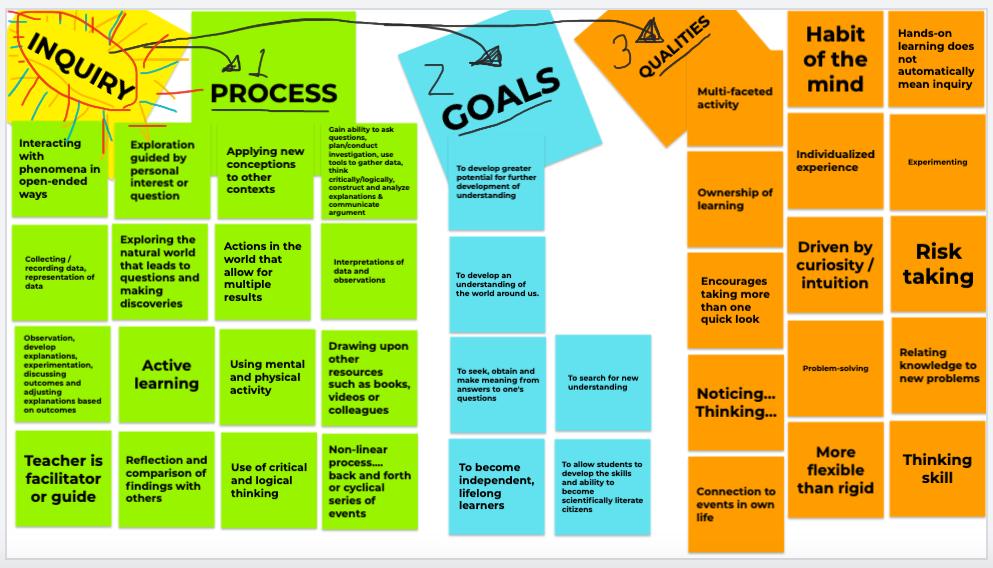
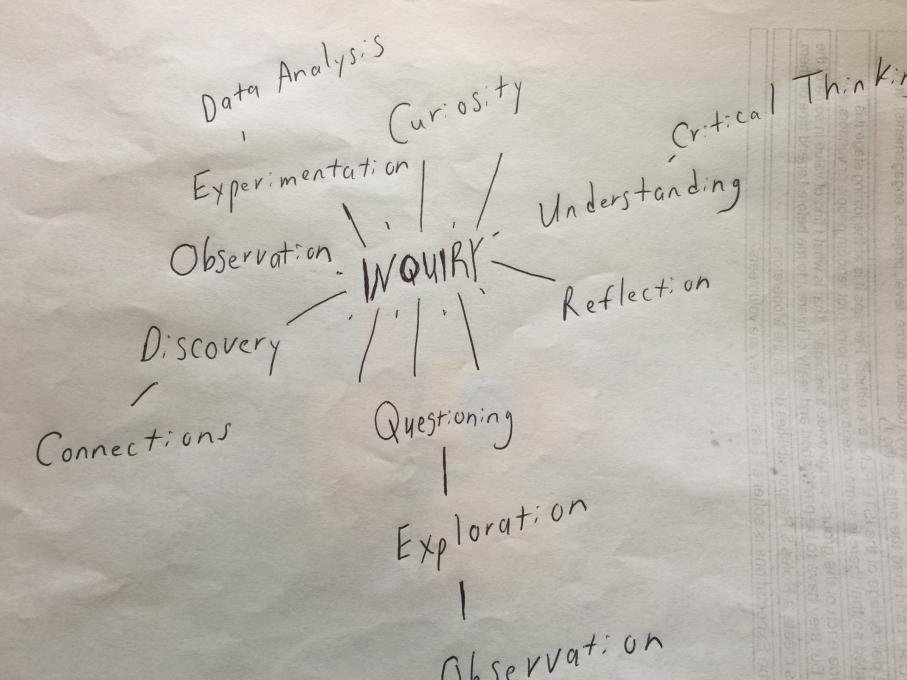
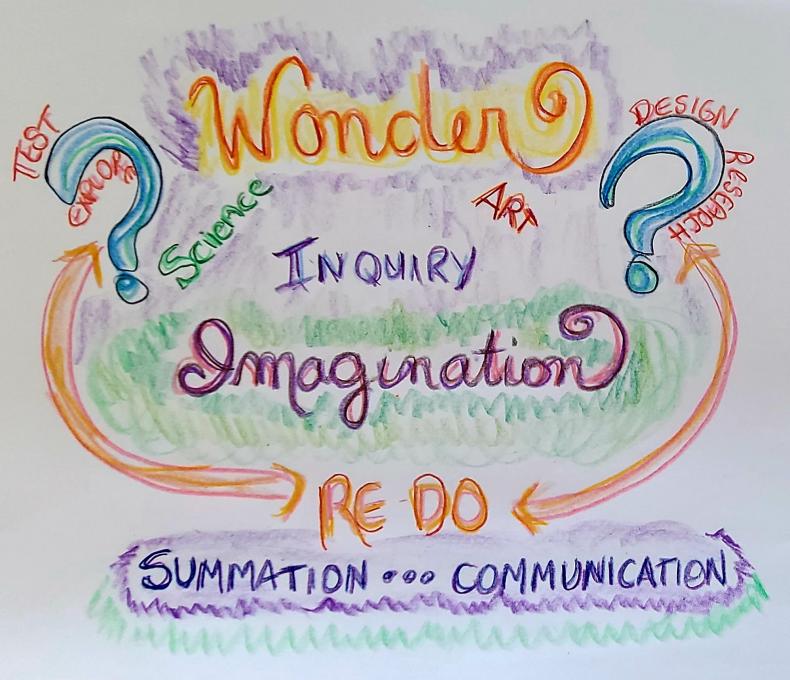 Inquiry is complex, yet, simple-- hah! It relies heavily on curiosity (wonder) the drives questions coming through the imagination. Science and art help with the questions-- which includes research, exploring, designing, testing, and re-doing, and redo-ing, and re-doing. Summation and communication can occur through out the process. Everything above it rests on those 2 words. Not a linear process.
Inquiry is complex, yet, simple-- hah! It relies heavily on curiosity (wonder) the drives questions coming through the imagination. Science and art help with the questions-- which includes research, exploring, designing, testing, and re-doing, and redo-ing, and re-doing. Summation and communication can occur through out the process. Everything above it rests on those 2 words. Not a linear process. 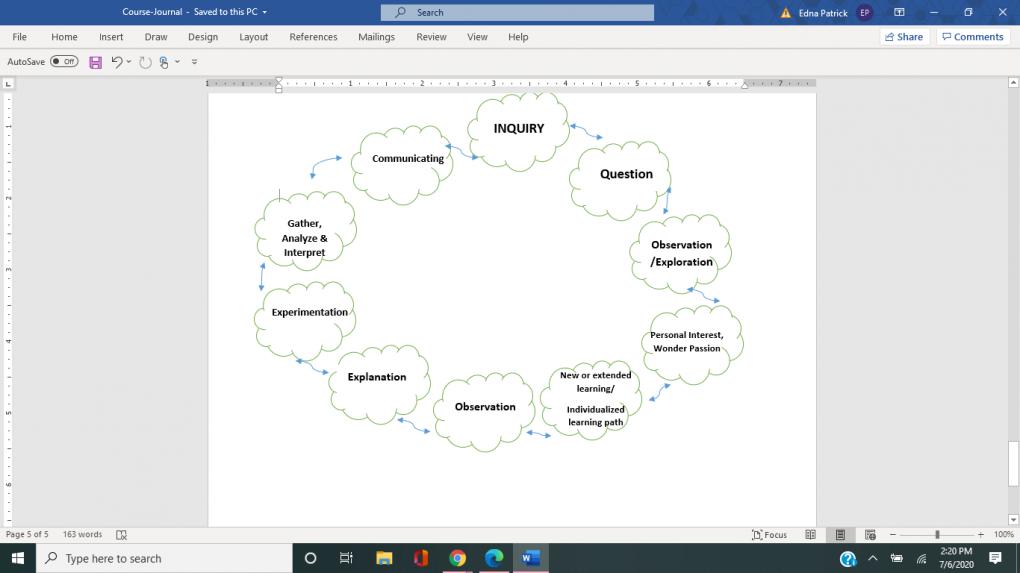
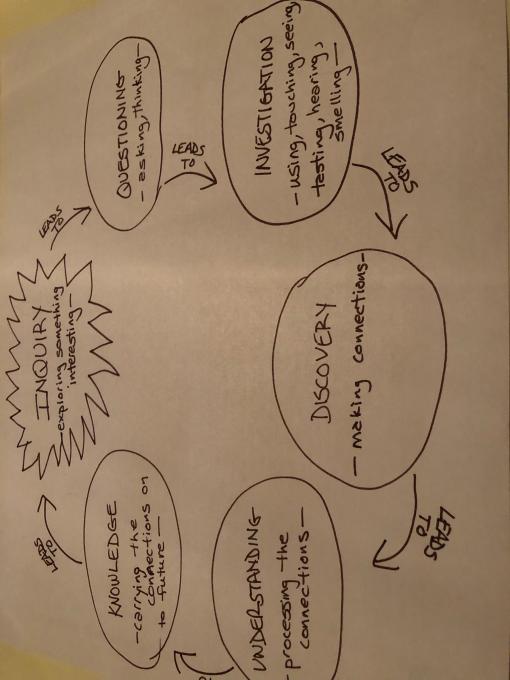 Inquiry is the process of exploring something interesting. It is opening yourself up to the world around you just as we did as infants! For me, it is a process of questioning, investigating, discovering, understanding and then finally, knowledge! Which then drives us into more INQUIRY and the process goes on and on!
Inquiry is the process of exploring something interesting. It is opening yourself up to the world around you just as we did as infants! For me, it is a process of questioning, investigating, discovering, understanding and then finally, knowledge! Which then drives us into more INQUIRY and the process goes on and on! 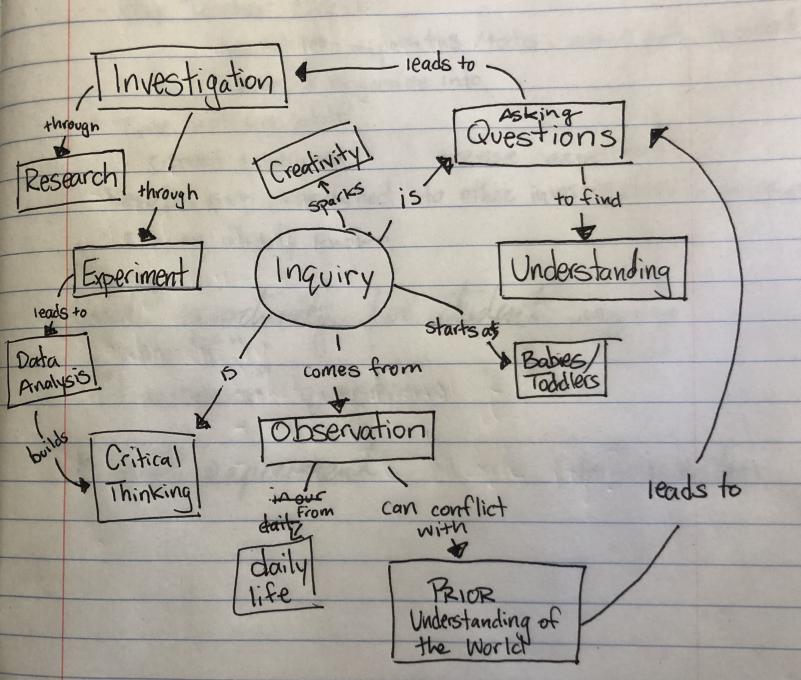
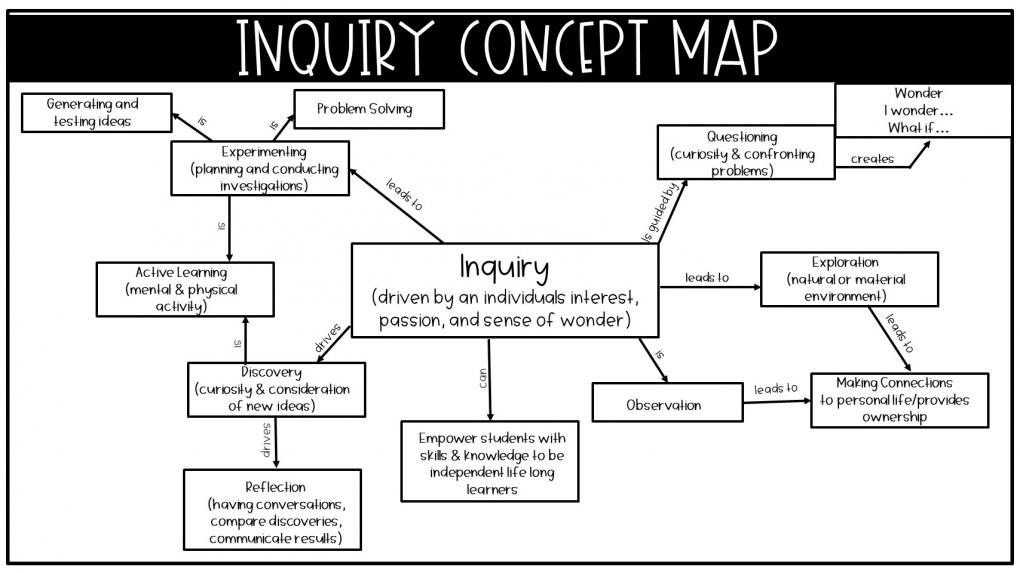
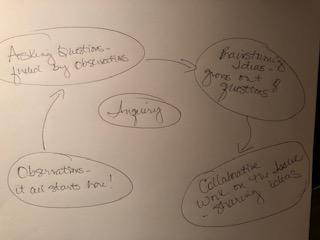 Inquiry is learning new information through the process of observing and asking questions. Having an opportunity to collaborate with others to share ideas to bring about understanding enhances inquiry.
Inquiry is learning new information through the process of observing and asking questions. Having an opportunity to collaborate with others to share ideas to bring about understanding enhances inquiry. 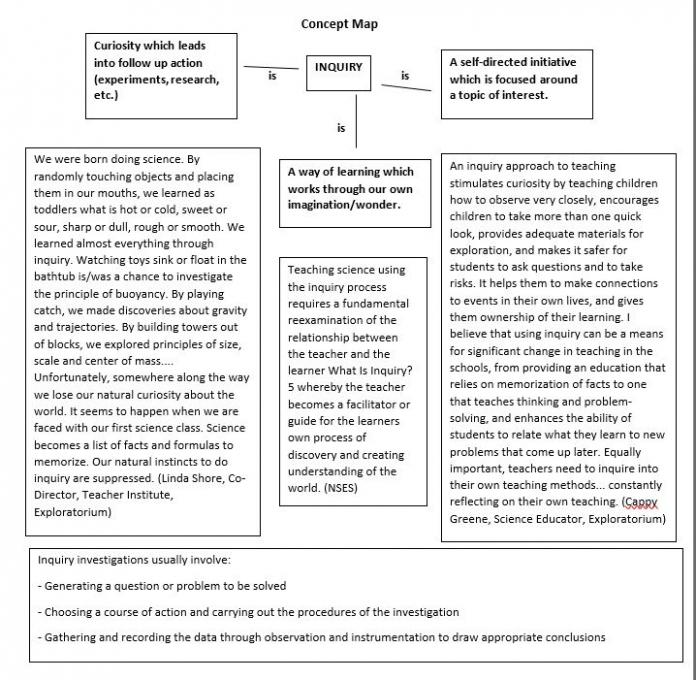 My concept of inquiry is based around the idea that we are there to teach children how to think, not what to think. Inquiry is encouraging/building the confidence and competence of students to formulate scientific questions about experiences they encounter in their world, look for the answer through research and experiments/more observations and then come to a conclusion based on that
My concept of inquiry is based around the idea that we are there to teach children how to think, not what to think. Inquiry is encouraging/building the confidence and competence of students to formulate scientific questions about experiences they encounter in their world, look for the answer through research and experiments/more observations and then come to a conclusion based on that 